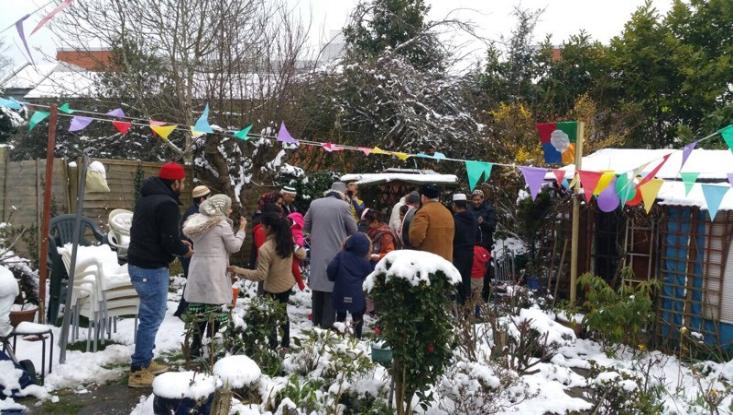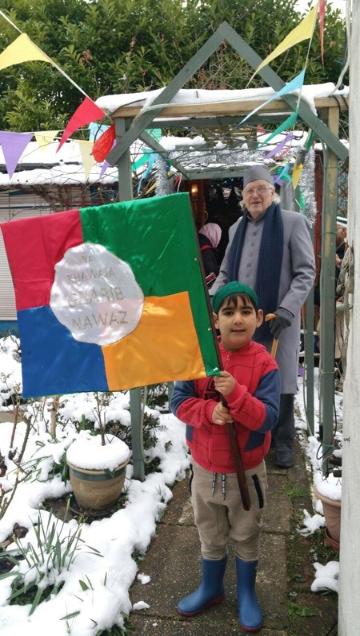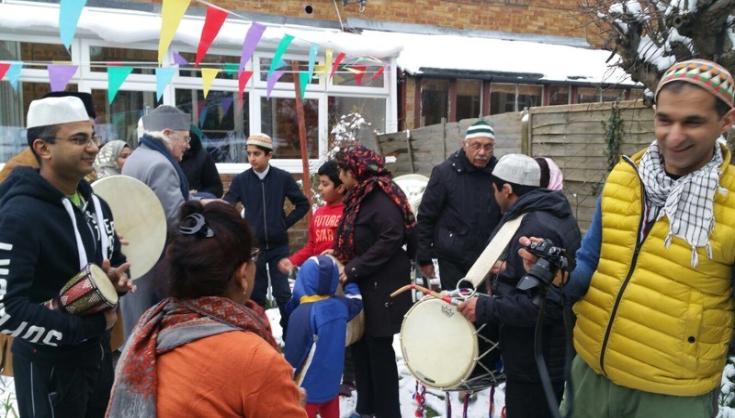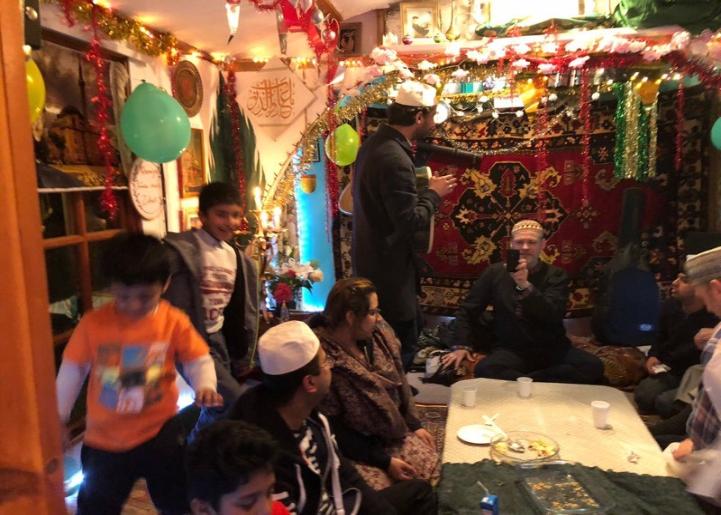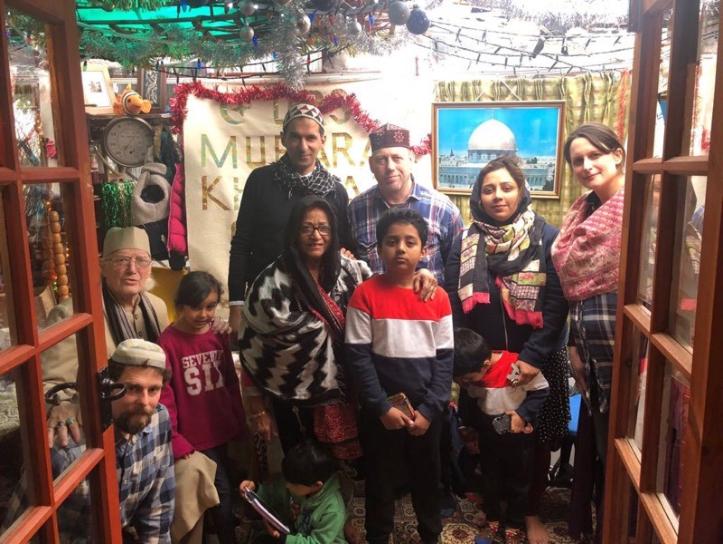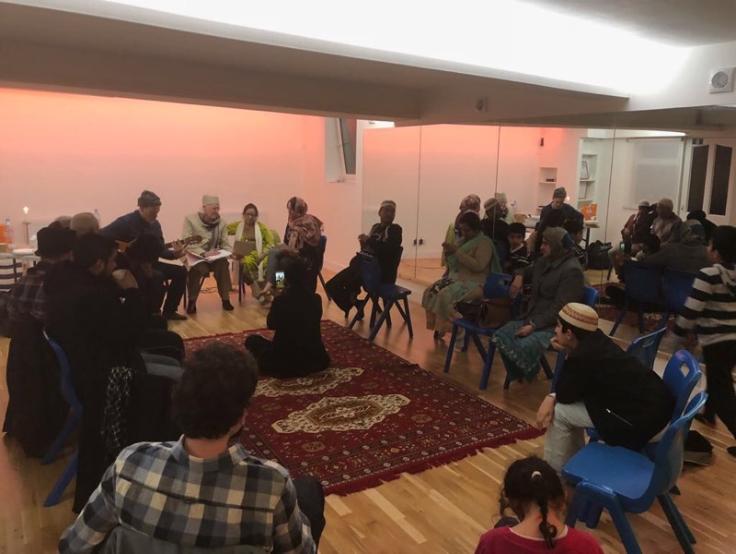| The 'Urs of Khwaja Muinuddin Hasan Chishti 2018 as celebrated in Southampton, UK. Salaams The ‘Urs began formally with a flag ceremony in Southampton. Though it was on March 18th there was unseasonal, but welcome, snow in Southampton giving a white, fresh glow to everything. There was a very good turn out despite the cold weather and we had the usual procession round the garden with the flag carried by 5 year old Isa the son of Riaz. Farhan, the son of Zulfikar and Taira played his huge drum as usual. The small garden filled up soon, not just with the snow but with warm and loving hearts, as well as slightly cold bodies. Snacks were provided and an atmosphere of good cheer was evident everywhere. The ensuing snowball fight we understand was in equally good spirit. Once the flag was in place, the next day the ‘Urs started. It meant we had short zikr followed by a snack and then Qwaali. Each night it got a little longer and in the end was until midnight. Mostly we played qwaali tracks from the CDs from Ajmer. There was Darud from Asif and some verses of the holy book were always read both before and at the end. The attendance was good every night and Zahuri Manzil was usually quite full. In addition of course there were many from Iran, Luqman from Jordan, and people other parts of England. Maryam Moghaddam was in Ajmer at the time, as was Yahya. We got updates about the programme being followed. Bahar and her children attended from Friday until Tuesday. Prior to all this a lot of cleaning and decorating work was done by Ali, Asif, Riaz, Adam, Abbas and others. This was to prepare Zahuri Manzil for the event. The garden was also decorated with bunting and baloons. On Friday after Juma Namaz there was an event at the mosque from 2pm till 4pm. There was zikr and speeches as well as Langar of course. Unfortunately as it was a Friday afternoon the children could not attend. This is the speech. ‘Urs of Khwaja Muinuddin Hasan Chishti 2018. Salaams. Today in Ajmer Sharif the celebrations yet again take place of the great Sufi Saint Khwaja Muinuddin Hasan Chishti. The Sufis of course are the followers of Hazrat Ali the son in law of the Holy Prophet Muhammed (saw). The quality most particularly associated with Khwaja Saheb is love for all. -------------------- Khwaja Hafiz Shirazi wrote so much beautiful poetry – amongst this was the immortal line – “The one whose heart is alive with love does not die ever”. Many people think that power and wealth in this world is all that is important. They are mistaken, but God knows best . Some people try to gain wealth and riches (sawab) in the next world. They are right to do so since such wealth and power is more enduring. It does not last however, and after some time those people sleep until the Day of Judgement. The saints too enjoy their sawab but when that is finished they do not sleep – Allah continues to provide blessing from Himself since they had Love for Him always in their heart. You can read about this from Shah Wali Ullah. Thus it is that Khwaja Saheb lives forever and not only lives but plays an active role in the management of the universe under Almighty Allah. He is known as the Emperor of India (meaning Pakistan, India and Bangladesh). So now let us commence our appreciation of Khwaja Saheb at the beginning. Our intention is to offer praise of and thanks to Allah and His holy Prophet Muhammed for this great person and his love for the One true God. To celebrate him not as one who is dead but as one who lives forever in the Mercy and Love of Allah. To be thankful for his message of concern for the poor and oppressed and his love for all, irrespective of caste, community, religion, colour or class. In short to make our reverential salams to him on the occasion of his Urs. Khwaja Saheb was the disciple of Khwaja Uthman Harooni, himself a great saint. He said of Khwaja Saheb; “Our Muinuddin is a beloved of God and I feel proud of the fact he was my disciple.” Khwaja Saheb was deeply devoted to prayers. He acted upon the saying of the holy Prophet Muhammed when he said that “Should I not become a thankful man?” Khwaja Saheb acted on this with full faith. It is said he finished two Qurans one in the day and one in the night. It is also said he would go on pilgrimage to Kaaba from Ajmer every year by means of his spiritual powers. It is even recorded that pilgrims could see him in Tawaf whilst he was seen at the same time in his own home. It became known that during Hajj he was present every night in Kaaba. His concern was for the Love of God and his face always appeared sorry and sad. Hazrat Qutub Saheb his sajjadanashin says that he was with him for twenty years and never heard him pray for his own health. Instead he used to say ”O God wherever there be the pain (of love) grant it to thy servant Muinuddin”. Khwaja Saheb was fond of music as a means to reach God. Sometimes in listening he would go into a state of rapture. People who were present with him would gain inner vision. He used to be joined by other saints of repute – such as Sheikh Shahabuddin Suhrewardy, Sheikh Muhammed and Sheikh Ohaduddin of Kirman, Sheikh Muhammed of Isfahan and many, many others. They were all benefited by his spiritual powers. He had great respect for his spiritual guide. It is told that when sitting with some people he would keep getting up any time he looked to his right. When asked why, he told the people that the tomb of his spiritual guide came into his vision when he looked on that side – so he stood out of respect. When Khwaja Saheb was absorbed or in contemplation he used to keep his eyes closed for hours at a time. He would only open them when the time for prayer came. When he was absorbed like this anyone sitting in his company who received his look when he opened his eyes became a saint. People who stayed for three days in his company developed mystical powers. He had two main moods – the first was elevated – and he would give no attention to those around him. At other times he would be in a thoughtful mood, at which time he would close his door. Hz Qutub Saheb and Hz Hamiduddin Nagore would build a stone wall as a kind of curtain and sit behind it. He was always obedient to the commands of the holy Prophet Muhammed (pbuh) in his daily life. The fear of God was always with him. He would tremble and cry. He feared the last resting place, the grave. He used to say that if people came to know of the conditions of people buried under the ground they would become like a pillar of salt. He had a forgiving nature. His heart was pure and clean and his mind pure. He wished evil to no one. He would avoid to hurt feelings. He was above distinctions of caste and class and colour. He never showed anger to people. He was generous in his nature and kind hearted. He was always ready to give a word of good cheer to the oppressed, the depressed, the helpless and the down- trodden. In one instant he would shower blessing on people and would enable them to reach great spiritual heights. Hazrat Qutub Saheb says – “In twenty years I never saw a beggar or any needy person go from his door without taking something.” He was hospitable and humble. He was the first to salaam. Every visitor he greeted with hospitality. He showed sympathy with the plight of people. A large amount of food was cooked in his kitchen. When asked for expenses for this he would lift up his prayer carpet and say “Take what you need from under this”. He used to give allowances to the dervishes and when any invalid came to him would console him and pray for him. Khwaja Saheb himself was of an ascetic nature. He fasted every month. Sometimes he would live for a whole week without taking anything. He dressed very simply wearing one cloth – when it was torn he would sew it up. He avoided publicity. He would stay in graveyards and when people came to know about him he would move on. He was a great scholar and poet as well as a mystic. There is a collection of his poetry in Farsi.There are a number of books credited to him. One book was written at the command of his guide Khwaja Uthman Harooni. It was for the guidance of Sultan Iltutmish. A translation is published by Sharib Press as ‘Meditations’. With regard to prayer Khwaja Saheb was asked once as to what was prayer for the mystic. He said, to see six things; To see ones parents in the morning with respect and to make salams. To see ones children with affection and love, To see the holy Quran with respect . To see see the face of the learned men with respect. Later he said that one who sees the learned men with respect and regard – the All-mighty God gives that person the reward of a thousand years of prayer. To see the gate of Kaaba is a kind of prayer. Later he said that to start with the intention of seeing see the gate of Kaaba can give a reward of a thousand years of prayer and Hajj. To be devoted to one’s spiritual guide. Khwaja Uthman Harooni said that service to the spiritual guide with affection and devotion gains a thousand palaces of pearls in heaven. It is important that the disciple should follow the spiritual guide and should do as he prescribes. For instance in giving prayers. One should be with him as much as possible to be benefited by his company. Once Gharib Nawaz said “There is no better thing before God than prayer” Qutub Saheb asked him what type of prayer. Khwaja Saheb said – Hearing the complaint of the aggrieved –to assist them To help the needy and oppressed To feed the people and free the captives Now let us pause in this unworthy appreciation of the greatness of Khwaja Saheb and let us recall his spiritual genealogy. The source of all things is All-mighty Allah, Lord of all the Worlds. All ths Sufi Orders owe their existence to the holy Prophet Muhammed (SAW). The head of the Khwaja Kwajagan is Hazrat Ali Murtaza bin Abi Talib (Salaams to him) The shilshillah of Khawaja Saheb is as follows. Hazrat Khwaja Hasan Basri SAW Hazrat Abdul Wahid bin Zaid SAW Hazrat Fuzail bin Ayaz SAW Hazrat Ibrahim bin Adhem SAW Hazrat Sadreeduddin Tul Marashee SAW Hazrat Aminuddin Hubera SAW Hazrat Mumshad Alu Denoori SAW Hazrat Abu Ishaq Shami Chishti SAW Hazrat Abu Ahmed Chishti SAW Hazrat Abu Mohammed Chishti SAW Hazrat Abu Yusuf Chishti SAW Hazrat Modood Chishti SAW Hazrat Hajji Sharif Zindani SAW Hazrat Khwaja Usman Haruni SAW Hazrat Khwaja Muinuddin Hasan Chishti SAW There were four successors of Khwaja Saheb Hazrat Qutubbuddin Bakhtiar kaki SAW Hazrat Baba Fariduddin Gange i Shakar SAW Hazrat Nizamuddin Aulia SAW and finally Hazrat Nasiruddin Chirag of Delhi SAW (with him the relics of the order were buried) It is also true to say that Khwaja Saheb was related to Hazrat Abdul Qadir al Jillani both through maternal and paternal descent. Khwaja Gharib Nawaz, as he became known, was born in Isfahan and grew up in nearby Sanjar in modern day Iran. His father Ghyasuddin, was a pious man of high spiritual standing. He died when Khwaja Saheb was only 14 years old, leaving him an orphan with a grinding stone and a garden as inheritance. It so happened that a wandering mystic known as Ibrahim Qandoozi came to that garden. Khwaja Saheb treated him so hospitably the mystic was pleased with him. He took a thing he had chewed in his own mouth and gave it into the mouth of Khwaja Saheb. The effect was extra-ordinary! In one moment Khwaja Saheb lost all interest in this passing life. He wanted to know the Gospel of Truth. He wanted to know about Eternal Life. He sold his grinding stone and his garden and gave the proceeds to the poor. He set off on the quest of a lifetime – a quest that was to prove so successful that to this day we speak of it, so many years later, and apparently so very far away. He studied the holy book and the hadiths etc. Then he became a disciple of Khwaja Uthman Harooni a great mystic of his age. Later he went on travels and was blessed by visits to such places as Kharaqan and the tomb of Hazrat Kharaqani. He visited the shrine of Hazrat Abu Said Abil Khair in Memne in Afghanistan where he stayed for two years. He also went to Kirman and to Baghdad. He stayed in Lahore at the shrine of Pir Ali Hujwiri for two weeks. In Herat he stayed at the shrine of Hz Abdullah Ansari. Back in Baghdad he took a second initiation with Khwaja Uthman Harooni. Let us hear from Khwaja Saheb himself; I, Moinuddin Hasan of Sanjar - well wisher of all the faithful, had the honour of meeting Hazrat Khawaja Uthman Harooni in the mosque of Khawaja Junaid of Baghdad (ra). His holiness was surrounded by inspired Dervishes…….(he).. asked me to offer two genuflexions…Then he asked me to sit with my face towards Kaaba– he asked me to recite sura Baqara – which I did. Further he commanded me to recite benedictions on the holy Prophet Muhammed (pbhu). I obeyed. Khawaja Uthman Harooni stood up and holding my hand lifted his face towards the sky and said --‘Come let me cause thee to reach Allah.’ After placing the four edged cap and bestowing a robe on Khawaja Saheb they sat down. There followed a day and night of asceticism. Khawaja Saheb continues. ‘The next day, when I attended upon him he asked me to sit down and recite Sura Ikhlas 4000 times. I did. He asked me to look towards the sky. I did. He asked me ‘How far do you see’. I replied ‘up to the Great Throne’. Next he asked me to look towards the ground. I did. He asked me, ‘How far do you see?’ ‘I replied – to the furthest reaches of the earth’ . Next he asked me to recite Sura Ikhlas again a thousand times. I did.He asked me to look towards the sky again. I did. He asked me ‘How far do you see now? I replied, ‘Up to the Great Hidden’. Next he asked me to close my eyes. I did. He asked me to open my eyes. I did. Then showing me two fingers, he asked me what I saw there. I replied 18000 worlds.’ After that Khawaja Saheb was instructed to look under a certain brick where he found some dinars. He was instructed to distribute them amongst the poor. Later the following account is given of events in Mecca on pilgrimage. Khawaja Saheb says: ‘After going round the Kaaba Khawaja Uthman Harooni took my hand and entrusted me to Allah. He prayed in Kaaba for my humble self. A voice was heard - ‘We have accepted Moinuddin’. On reaching Medina they presented themselves at the court of the holy Prophet (pbuh). Khawaja Saheb was instructed to offer his reverential salaams. A voice came out saying ‘Peace be on you also, O head of the Pious of the Earth and the Sea.’ On hearing this Khawaja Uthman said - ‘Now, indeed, you have reached perfection’. One day when Khawaja Saheb was absorbed in prayer in Kaaba he heard a voice saying: ‘O Moinuddin! We are greatly pleased with thee. Thou art given salvation. Ask for anything thou may like so that We may grant it to thee.’ Khawaja Saheb prayed not for himself but for the salvation for his followers and disciples and the reply came: ‘O Moinuddin thou art our accepted one. I will give salvation to thy followers and disciples, and also to those who may enter thy fold till the Day of Resurrection.’ After reaching Medina he received from the holy Prophet (pbuh) in the Quba Mosque, a mandate to the effect that: ‘O Moinuddin! Thou art a helper of my religion. I entrust to thee the country of Hindusthan. There prevails darkness. Proceed on to Ajmer and spread there the gospel of Truth’. Khawaja Saheb became drowsy and was blessed with seeing in vision, the city of Ajmer. He was bidden farewell and given the gift of a pomegranate from heaven. Now he began that mission which was to consume the rest of his life. To bring the gospel of Truth to the dark divided continent of India by divine command. He made Qutub Saheb his successor though Qutub Saheb was only 17 years old. This came after a dream which he had for forty nights. In that dream the holy Prophet appeared and told Khwaja Saheb to do this. Eventually, Allah himself appeared and said to make Qutub Saheb the successor. Accordingly in Baghdad that actually happened. Khwaja Saheb also made a prophecy whilst in Baghdad, that Sultan Il Tut Mish, who was then 12 years old, would become Emperor of India. This actually happened and he was to become Khwaja Saheb’s disciple too. Eventually Khwaja Saheb settled in Ajmer and on occasions would go to Delhi where Qutub Saheb was settled. Now Khwaja Uthman Harooni visited Delhi. Khwaja Saheb himself mention that he had served Khwaja Uthman for twenty two years. He and Khwaja Qutub Saheb found a quiet place for him to stay in Delhi. Whilst there the Sultan, Il-Tut Mish, came to meet him and begged to become a murid. In response to the request of his guide Khwaja Saheb wrote a book to be called Gange- ul-Isra. Even after Khwaja Uthman left Delhi the Sultan spent time in Khwaja Saheb’s company whilst absorbed in the study of his book. He gained the rank of saint. After this Khwaja Saheb left Delhi and settled permanently in Ajmer. Eventually when his time came and his work in this mortal body was complete and the message of the overpowering importance of Love of Allah was established as a doctrine that should be available to all whatever their background or religion, he was finally united with his Beloved forever. I will give you the description written in the book of my own Shaikh Dr Zahurul Hasan Sharib. On Monday the 6th of Rajab 627 AH – the 21st May 1229 Gharib Nawaz after night prayers went into his room and closed the door. He did not permit anyone to enter in. All night long the people outside heard a mystic sound coming from the room.... At the approach of dawn the sound was not to be heard. When the door remained closedat the time of the morning prayers his devotees thought there was something unusual. In short, when the door was opened they found him dead and on his forehead was written these words: Haza habeeb Allahi Mata fii hub Allahi 'He was a beloved of Allah, He died in the love of Allah'. That night in dream some saints saw the holy Prophet Muhammed saying: "Moinuddin is a friend of Allah. Today I have come to welcome him". Qutub Saheb his successor wrote this: ‘.. I felt a little drowsy whilst sitting on my prayer carpet. I saw that he (Gharib Nawaz) I was standing underneath the throne of God. I put my head upon his feet and inquired his condition. He replied: ‘God has been merciful enough to shower His blessings upon me. He has allotted me a place near the angels and thus underneath His Throne. I live here’. Listen to some of the titles he was given. Ata-i-Rasul, (gift of the holy Prophet) Khwaja i Ajmer, Khwaja i Bazurg (great Khwaja) Hind ul Wali (Saint of India) Gharib Nawaz (Patron of the Poor) Sultan-ul Hind Naib-i-Rasul-fil Hind (Deputy of the holy Prophet in India). Other names include: Taj-ul-Ashiqeen, Aftab–i-Jehan. Paneh-e-Bekasen (shelter of the helpless). Song From Sweet Sanjar O Lord of the worlds what mercy you had, When you brought us a light from sweet Sanjar What breadth and depth of vision he had, That true man who came to us from sweet Sanjar. Ya Sanjari, Ya Ajmeri, Ya Khawaja Gharib Nawaz. What a power to make hearts carefree and glad he had, That true lover of Allah that came from sweet Sanjar, What beauty that deputy of holy Mustafa had, That pilgrim of love’s way that came from sweet Sanjar Ya Sanjari, Ya Ajmeri, Ya Khawaja Gharib Nawaz. The courage of a lion from brave Hazrat Ali he had, That illustrious Saint who came to us from sweet Sanjar. The loving look of Khawaja Uthman harooni he had, That Pir o Murshid who came to us from sweet Sanjar,m Ya Sanjari, Ya Ajmeri, Ya Khawaja Gharib Nawaz. How great was the Baraka of the Chishti saints he had. That Sultan -ul Hind that came to us from sweet Sanjar. He opened his heart to all, both happy and sad, Millions flock to the door of the Saint from Sanjar. Ya Sanjari, Ya Ajmeri, Ya Khawaja Gharib Nawaz. ----------------------------------- Let us briefly give attention to the one thing above all others for which Khwaja Saheb is known – I mean the Ishq of Allah – the love of God. His idea was that one does not turn away from the door the poor the aggrieved, the helpless, the homeless, the destitute. Nor does one turn away people of different religions or beliefs. The Mercy and Love of Allah is comprehensive. Take to Khwaja Saheb a heart longing for purity and know that it will be received and assisted. Many people go and pray to him for specific things, a child, a cure, a job and so on. So often he responds to these requests but often people pray for what is not good for them. I would say just ask for his help, he knows better than us what is good for us. The Qur’an says that often people pray for things that would harm them. Love according to Khwaja Saheb is comprehensive, and not limited. The best outcome for the real lover of Allah is as Khwaja Junaid said is honour, prestige, and leadership bestowed by All-mighty Allah. In the case of Khwaja Saheb we see this evidence with our own eyes. Gharib Nawaz himself says that God has made His lovers happy and content with His friendship and Love. He also said that one should try to know the secret of everlasting life. If not it is better to be devoted to piety. Khwaja Saheb quotes Hazrat Bayazid Bustami telling of a time when he sat in the desolate place of Bastam. The Love of God became so intensified that everything – every branch and root and tree every fruit and stone had love coming out of it. He said – “I wished to come out from the Kingdom of Love but I could not”. Gharib Nawaz tells how when Allah brought Adam into existence He said to him, “Pray – i.e. remember me in your heart. Know me to be present in your body. Give place to my Love in your head. I have produced you for this purpose that you might know Me, glorify Me, and love Me.” Many people from all walks of life gather in Ajmer for the Urs. The rich and the poor, the happy and unhappy, the old and the young, Christians, Jews, Muslims, Hindus, Sikhs and Jains. People from many nations – white and black and every shade between. Men and women and children. Doctors plumbers, teachers, road sweepers, computer operators, taxi drivers, scholars, muftis, playboys, grey-beards and young girls, landlords and tenants, farmers, engineers, pop stars, and so on. They bring their burdens and return cleansed and purer. Love of God gives to Khwaja Saheb this great power. Love as they say is in the air. Khwaja Saheb describes it as fire in which the sins of the visitor is burnt up. He says there is no fire greater in its intensity than the fire of love. O Gharib Nawaz our appreciation of you falls so far short of what it should be but you are constantly forgiving. Please accept this offering of your 'Urs from Southampton. Grant us your blessings so that we may be pleasing to the All- mighty. Bless we pray those here present both virtually and physically. Grant us a little of the Love that almighty Allah has bestowed on you. There is no God but He. O Khawaja Saheb with one voice we say Mubarak for your 'Urs. Song Ya Sanjari, Ya Ajmeri, Ya Khawaja Gharib Nawaz. Gharib Nawaz Ya Gharib Nawaz, ya Gharib Nawaz, No sweeter name there ever was, Many miracles from Allah came and went The message of Love remained – heaven sent. Ya Sanjari, Ya Ajmeri, Ya Khawaja Gharib Nawaz. Gharib Nawaz Ya Gharib Nawaz, ya Gharib Nawaz, No sweeter name there ever was, When the time to meet his Beloved came The angels were surely singing this name Ya Sanjari, Ya Ajmeri, Ya Khawaja Gharib Nawaz. Gharib Nawaz Ya Gharib Nawaz, ya Gharib Nawaz, No sweeter name there ever was, Now beneath Allah’s throne he lives And to all the sincere, blessings he gives. Ya Sanjari, Ya Ajmeri, Ya Khawaja Gharib Nawaz. Gharib Nawaz Ya Gharib Nawaz, ya Gharib Nawaz, No sweeter name there ever was, He does not judge by what they say But how in their heart they pray. Ya Sanjari, Ya Ajmeri, Ya Khawaja Gharib Nawaz. Gharib Nawaz Ya Gharib Nawaz, ya Gharib Nawaz, No sweeter name there ever was, Muslim, Sikh, Hindu, Christian, or Jew, He never refuses those who are true. Ya Sanjari, Ya Ajmeri, Ya Khawaja Gharib Nawaz. Gharib Nawaz Ya Gharib Nawaz, ya Gharib Nawaz, No sweeter name there ever was, To his ‘Urs they come from everywhere Presidents and paupers to say their prayer Ya Sanjari, Ya Ajmeri, Ya Khawaja Gharib Nawaz. Gharib Nawaz Ya Gharib Nawaz, ya Gharib Nawaz, No sweeter name there ever was, Now we hear this refrain everywhere Even from those who only in spirit are there. Ya Sanjari, Ya Ajmeri, Ya Khawaja Gharib Nawaz. Gharib Nawaz Ya Gharib Nawaz, Ya Gharib Nawaz, A sweeter name there never was. O Gharib Nawaz hear this our plea, Cleanse the mirror of our heart that we may be In wonder at the love Allah has for thee, And from ignorance and doubt ever be free. Ya Sanjari, Ya Ajmeri, Ya Khawaja Gharib Nawaz. Gharib Nawaz ______________________ Following the ‘Urs proper we had an evening of poetry recital. Known in Ajmer as the Mushaira. For this we went to “Better Living” a very good hall that Riaz has named after a phrase of Zahurmian. The sound quality there is excellent. Farhana read Urdu poetry on Khwaja Saheb.Jamil read some English translations of Zahurmian’s and Nawob Saheb’s poetry on Khwaja Saheb. Others such as Danish and his son contributed . After the poetry there was some music making with Mikail and Bahar. There were some more celebrations held and on the last night the Mehfil-i- Rindan. This was the closing event. May Almighty Allah forgive us. _______ |

